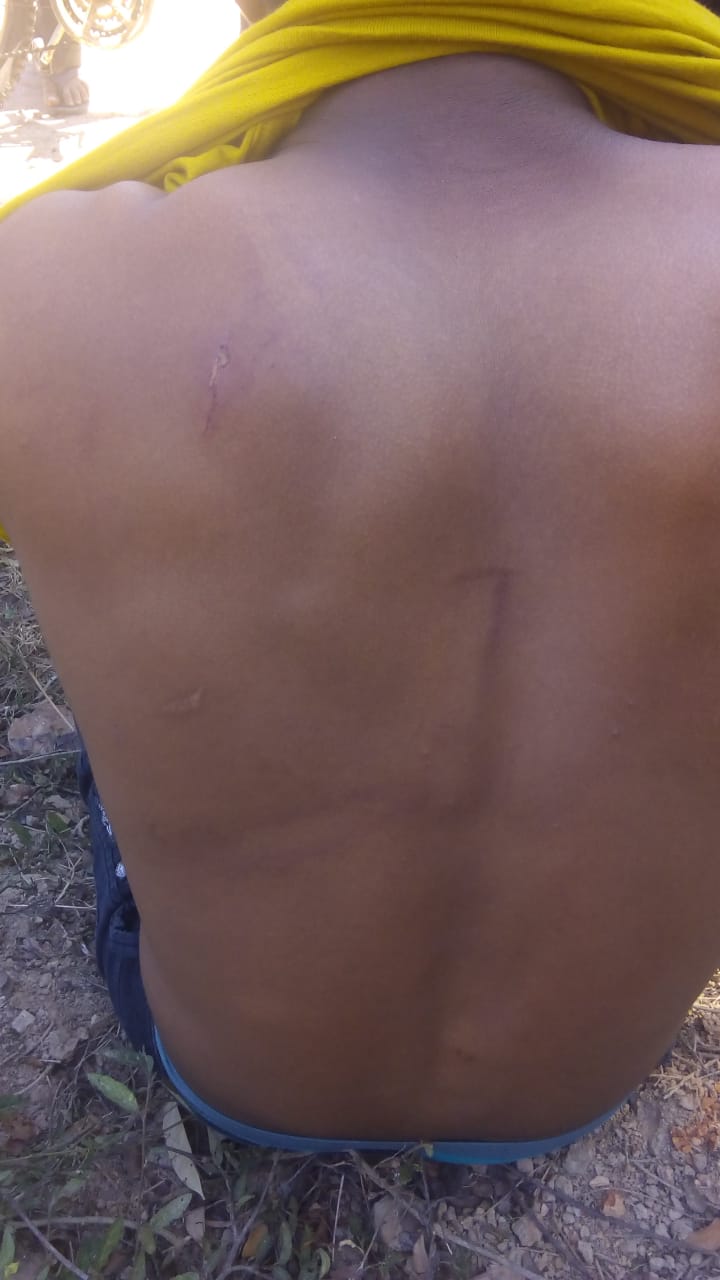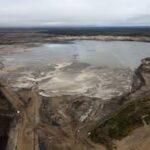[The photograph above shows a vest warn by a human rights defender from the village of Guapinol in Honduras.]
June 10, 2019
On June 7, 2019, I travelled to Honduras to join a six-member delegation for a human rights fact-finding mission.
The five other members of the delegation are: Michael Berghoef, a Professor of Social Work at Ferris State University; Pedro Cabezas, a Coordinator with the Central American Alliance Against Mining; Amanda Grzyb and Bernie Hammond, an Associate Professor and a Professor Emeritus, respectively, of Western University in Canada; and Ainhoa Montoya, a Lecturer at the University of London.
The members of our delegation are pictured below:

The focus of our delegation’s fact-finding mission is resource exploitation in a protected, natural park near the town of Tocoa. For years, local residents have resisted mining exploration and development in that park, rightly fearing that mining activity will greatly exacerbate a severe water crisis in their region.
As we have already learned, the corrupt, illegitimate and far-right government of Juan Orlando Hernández has reacted to the concerns of local residents with harsh repression.
Who is Juan Orlando Hernández?
From 1963 to 1981, Honduras was ruled by authoritarian military regimes. The military dictatorship ended in 1981, when Roberto Suazo Córdova was elected President.
Thereafter, Honduran politics were dominated by the conservative National Party of Honduras (PNH) and the liberal Liberal Party of Honduras (PLH).
In 2009, a coup-d’état removed from power the centre-left President, Manuel Zelaya of the PLH, and installed in his place Roberto Michiletti, the President of the Honduran Congress.
Elected as a liberal, Zelaya had shifted his presidency to the left. Approximately one year prior to the coup, Zelaya forged an alliance with Hugo Chávez’s Bolivarian Alliance for People of our America (ALBA).
Promptly following the coup, Michiletti declared a “state of exception”, suspended civil liberties and imposed various curfews.
The U.N. General Assembly, the Organization of American States (OAS) and European states all denounced the coup and called for the restoration of Zelaya.
Although the then-President of the United States, Barack Obama, acknowledged Zelaya’s ouster to have been a coup, his Secretary of State, Hillary Clinton – under the advice of John Negroponte, the Reagan-era ambassador to Honduras who was implicated in the Iran-Contra Affair – secretly supported the coup.
The pretext for the coup was that Zelaya had called for a referendum to determine whether Hondurans wished to convoke a special constitutional congress. Zelaya’s opponents accused him of wishing to amend the constitution to permit him to seek re-election, which was barred by the Honduran constitution.
The country’s current leader, Juan Orlando Hernandez (JOH) of the conservative PNH, first became the President of Honduras in January 2014, at which time he vowed to be “faithful to the Republic, its Constitution and the laws.”
In 2017, JOH sought re-election despite the constitutional prohibition against a second presidential term.
In the 2017 election, JOH’s principal challenger was Salvador Nasralla, founder of the anti-corruption party and a harsh critic of corruption at the highest levels of the Honduran Government. In the 2017 election, Nasralla ran for the Alliance of Opposition to the Dictatorship.
On the day before the 2017 election, The Economist published evidence of an apparent plan by JOH’s party to commit electoral fraud. The next day, the election results came in irregular waves. With 60% of the votes counted, the polls showed a significant lead for Nasralla. Then the electronic voting system went off the air for 36 hours. When the system came back up, JOH was winning. He was ultimately proclaimed victor by a razor-thin margin.
International observers soon identified “strong indications of election fraud.”
Large protests followed. Honduran security forces brutally suppressed them. Human rights organizations counted more than 30 people killed by security forces, at least four of whom were under the age of 18.
The Canadian government of Justin Trudeau reacted shamelessly to this brazen subversion of Honduran democracy. As Yves Engler recently observed:
[Justin Trudeau’s government] immediately endorsed the electoral farce in Honduras. Following Washington, Global Affairs tweeted that Canada “acknowledges confirmation of Juan Orlando Hernandez as President of Honduras.” Tyler Shipley, author of Ottawa and Empire: Canada and the Military Coup in Honduras, responded: “Wow, Canada sinks to new lows with this. The entire world knows that the Honduran dictatorship has stolen an election, even the OAS (an organization which skews right) has demanded that new elections be held because of the level of sketchiness here. And — as it has for over eight years — Canada is at the forefront of protecting and legitimizing this regime built on fraud and violence. Even after all my years of research on this, I’m stunned that [foreign minister Chrystia] Freeland would go this far; I expected Canada to stay quiet until JOH had fully consolidated his power. Instead Canada is doing the heavy lifting of that consolidation.”
Since the 2009 coup-d’état, poverty in Honduras has soared. In 2010, 50% of the population were living below the poverty line. By 2016, more than 66% were living below the poverty line.
Honduras is one of the poorest countries in the Americas. It is ranked 133 of 188 countries on the Human Development Index.
Since JOH assumed power, his government has pursued a radical neoliberal plan that is vehemently opposed by a broad swath of the population. Spending on healthcare and education has been eviscerated, while defence spending has increased. As reported recently by The Guardian:
Spending on education and culture has dropped from 32.9% of the central government budget to 19.9% over the past decade, with a de facto freeze on wages and infrastructure spending.
[…]
The public health service is also close to collapse, with widespread shortages of medicines, staff, beds, cribs and equipment. About 40% of emergency rooms have inadequate medical cover, according to the National Commission for Human Rights.
Less than 10% of this year’s central government budget is allocated to health, compared with 14.3% in 2010. A previous wave of protests erupted in 2015 when it was revealed that at least $350m was stolen from the state run health insurance system, (IHSS) – some of which ended up in Hernández’s 2013 election campaign coffers.
[…]
Honduras’s security and defence budget increased from 12.5% to 14.5% in the past decade, but Honduras remains one of the most dangerous countries in the world outside an official war zone, with 31 massacres (three or more murders) registered in the first five months of 2019 – compared to 39 in all of 2018.
Not only has JOH gutted spending on healthcare and education, but his government has become embroiled in multiple corruption scandals.
In addition, American prosecutors recently unsealed court documents from 2015 which name JOH as a target of a major investigation into “large-scale drug-trafficking and money laundering activities”. Those court documents also named several close confidants of JOH, including his deceased sister, Hilda Hernández, and the security minister, Gen Julián Pacheco.
The president’s younger brother and former congressman, Tony Hernández, was arrested in the United States last November and charged with conspiring to traffic tons of cocaine stamped with his initials.
Despite the scandal, corruption and socio-economic disaster that have engulfed JOH’s regime, he has managed to maintain his grip on power with Western government support and by brutally repressing the resistance to his illegitimate rule. As reported recently by Amnesty International:
Mass protests, which began on 29 November around the country to denounce the lack of transparency around the presidential election, were brutally repressed by security forces. Hundreds of people were arrested or detained and a 10-day curfew was implemented in December. Security forces used excessive force against protesters, including with lethal weapons. At least 31 people were killed, and multiple cases of people being injured by firearms or brutally beaten by security forces were also reported, as well as cases that could amount to torture and other cruel, inhuman and degrading treatment.
Resource Extraction in Protected Areas of Honduras
Within this backdrop of rising poverty, endemic government corruption and social unrest, our delegation has travelled to the northern town of Tocoa, in the Honduran department of Colón. Tocoa lies on the edge of the Parque Nacional Montaña de Botaderos (also referred to as the Carlos Escaleras National Park), a protected region characterized by a high degree of biodiversity.
According to Juan Lopez of the Committee for the Defence of the Commons, Parque Nacional Montaña de Botaderos consists of 96,000 hectares and is the source of 34 rivers. Those rivers provide water for six municipalities located in three different departments of the country.
Following a series of government measures that have facilitated the accumulation of agricultural lands by large corporate interests, the region now contains 75,000 hectares of African palm tree plantations. That amounts to 10 million palm plants. One African palm tree consumes, on average, 20 litres of water per day. This palm tree industry thus consumes 200 million litres of water daily. Largely as a result of these developments, the region now suffers from a severe water crisis.
Despite the water crisis and the protected status of Parque Nacional Montaña de Botaderos, the government of JOH has granted permits for mine exploration and development within the park. An iron oxide mine situated within the park is now under construction. The mine will be operated by mining company Inversiones los Pinares, which is owned by Lenir Perez and his wife Ana Facussé.
Ana Facussé is the daughter of one of the largest landowners and businessmen in Honduras, Miguel Facussé. According to a 2012 report by Reporters Without Borders:
Agro-industrialist Miguel Facussé Barjum is a member of one the powerful oligarchic families that control Honduras’ wealth. He heads Dinant, a company specializing in producing and marketing palm oil, and was one of the leading supporters of the June 2009 coup that toppled President Manuel Zelaya and paved the way for a still-continuing crackdown on opposition and grass-roots media. Its targets include small radio stations that defend the interests of local communities and often challenge those of big landowners such as Facussé.
Facussé has a private militia that can count on support from the police and army to impose his will. A total of 26 journalists have been killed in Honduras in the past decade, 19 of them since the 2009 coup.
The site of the processing plant for the new iron oxide mine of Inversiones los Pinares lies next to the Guapinol River, whose source lies within Parque Nacional Montaña de Botaderos. One of the communities which depends on that river for its water is the village of Guapinol.
For several weeks in late 2018, inhabitants of Guapinol and other communities of the Tocoa municipality peacefully resisted the mining project by organizing the ‘Guapinol camp in Defense of Water and Life.’ The camp is pictured below:

On October 27, 2018, the camp was violently attacked by 1,500 police and military personnel with live bullets and tear gas. According to The People’s Dispatch:
The repression resulted in the death of two members of the military and one community member, while dozens more were left with bullet wounds and breathing trouble due to the tear gas. Three people were also arrested. The security forces remain in the zone and human rights organization have denounced the “imminent human rights violation of the Tocoa population by police and military”. On Monday, a curfew was announced in the region and organizations reported more police arriving in the area.
Yesterday (June 9), our delegation drove to the village of Guapinol from Tocoa.
On our way to Guapinol, we passed by the entrance to the mine site. The dirt road appearing in the photograph below leads into the Parque Nacional Montaña de Botaderos:

Tocoa and the surrounding area have become highly militarized. The video below was taken as we approached a military check-point in a vehicle. The check-point lay between the entrance to the mine site and the village of Guapinol. As we approached the check-point, we saw a banner suspended from tree branches overhead (on the left side of the video) on which local residents had written “FUERA MINA” (out mine):
[wpvideo YknpeBdw]
Upon our arrival in the village of Guapinol, residents of the community accompanied us to the banks of the Guapinol River and to the construction site of the mine, which lies steps from the river’s banks.
The construction of the mine has led to the razing of an African palm plantation and a cattle farm, the remains of which are now surrounded by a 5-meter tall metal fence topped with razor-sharp barbed wire:
[wpvideo SMCJgilj]

In the Guapinol River, water defenders have painted onto boulders their slogans of solidarity, such as “el agua es vida” (water is life) and “cuidemos los bosques” (let’s take care of the forests):
[wpvideo bloC1nms]

Several months ago, during an earlier construction phase of the mine, the clear waters of the Guapinol River became brown and muddy:


The effects of mine construction on the Guapinol River rendered the tap water of the village of Guapinol unfit for human use, as shown by this photograph of muddy water emerging from the faucet of a local resident:

The contamination of the tap water of Guapinol caused considerable hardship to the vulnerable members of this community, a majority of whom depend for their survival on remittances from family members living abroad.
According to residents, the hardship they have endured has been accompanied by random acts of oppression by Honduran security forces. Locals reported to members of our delegation that, several days ago, armed police officers appeared in Guapinol and detained 8 young men, beating several of them. A community leader immediately contacted the local police chief and demanded to know why these young men had been detained and beaten. Shortly thereafter, the young men were released, but no explanation was given for the conduct of the police. Residents provided to us photographs showing the effects of the beatings on three of the detainees, one of whom (a child) required stitches to his left ear:



In the days ahead, our delegation will continue to gather information from local residents and other sources to document violations of human rights and other abuses committed by the Honduran government and security forces.
I will also be compiling reports on these matters for The Real News Network.






[…] week, while travelling in Honduras with an international human rights delegation, I interviewed anti-government protesters who had blocked traffic for miles by occupying a bridge […]
[…] of the Guapinol Camp in Defence of Water and Life from this article by Dimitri […]